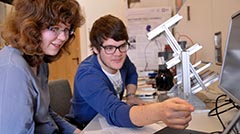CosmicLab for students at DESY in Zeuthen
A new nationwide particle physics education and communication project called KONTAKT, funded by the Federal Ministry of Education and Research (BMBF), will be launched on 1 January 2019. Its primary goal is to introduce young people, but also the interested general public, to the physics of the smallest particles. Scientists from 30 universities and research institutes in Germany are cooperating in the project that promotes dialogue between science and society and tests new forms of participation. Young people and teachers can get to know the fascinating research done at accelerators and particle detectors and carry out their own measurements during research days in schools, at school labs or museums. In addition, a mobile exhibition module is being developed that will tour Germany to allow people to participate in exciting research on the topics of the Big Bang, particle collisions and antimatter.
In particle physics, the open handling of research data, the invitation to participate and the dialogue with citizens are important cornerstones of research. The universities and research institutes regularly open their doors to the interested public and invite them to lectures, discussions or laboratory tours, during which one can immerse oneself in the experiments using virtual reality formats, among other things. The new project KONTAKT – an acronym of Kommunikation, Nachwuchsgewinnung und Teilhabung der Allgemeheit an Erkenntnisse in der Gebiet der Kleinsten Teilchen (CONTACT - Communication, Attracting Young Scientists and Sharing Knowledge in the Field of the Smallest Particles) builds on these activities and combines them with programmes aimed specifically at young people, teachers and the general public.
To this end, the project uses the proven structures of the nationwide teaching network Netzwerk Teilchenwelt. In its multi-stage programme, pupils can participate in research and analyse real data from CERN, the IceCube detector and the Pierre Auger Observatory or make their own measuremnts of cosmic particles with tabletop detectors. "These services are mobile and take place in schools or other educational institutions throughout Germany - even beyond the big university cities," explains Michael Kobel, Professor of Particle Physics at Dresden University of Technology and project leader of KONTAKT. "Many young people are interested in current physics research and want to learn more about Higgs particles or neutrinos. We are happy to discuss our findings on the structure and origin of the universe with them," says Kobel. Especially motivated young people have the opportunity to do real scientific work in the subject areas in advanced programme stages directly at CERN and at the research institutes.
In order to give citizens a playful insight into the contents and methods of particle physics, an interactive exhibition module is being developed as part of the particle physics communication project Weltmaschine at DESY in Hamburg, which will then travel through Germany. "We are not waiting for visitors in a university lecture hall; instead, our module will come to the people. At the market and on the high street anyone can try out different games in which they can handle real data from the particle collider," explains Joachim Mnich, Director of Particle and Astroparticle Physics at DESY. "You don't have to be a physics fan to do that - but maybe you will become one afterwards.” Scientists accompany the module and establish dialogue with the public from pure research topics to information about the value and benefits of basic research for society.
In elementary particle physics, scientists worldwide are doing research at large-scale facilities. These include the Large Hadron Collider LHC at the European Research Centre for Particle Physics CERN in Geneva, the IceCube detector at the South Pole, the Belle II detector in Japan and the Pierre Auger Observatory in Argentina. Research into elementary particles such as the Higgs particle and neutrinos can provide us with new insights into the structure and origin of the universe. Important research results are achieved in the international collaborations, but the foundations are also laid for innovations - for example, modern treatment methods in tumor therapy. KONTAKT aims to transfer concepts and programmes for science communication that have proven their worth in the field of elementary particle physics to hadron and nuclear physics. German research groups are also widely represented in this field, for example by participating in the experiments at FAIR (Facility for Antiproton and Ion Research) at the GSI Helmholtz Centre for Heavy Ion Research in Darmstadt.
KONTAKT will be funded by the BMBF with a total of 1.28 million euros within the framework programme "ErUM - Exploration of Universe and Matter" between 1 January 2019 and 30 June 2021. The project management is based at the TU Dresden, DESY in Zeuthen is in charge of the particle detectors subproject, another subproject is coordinated at CERN.
The participating research institutions are:
- RWTH Aachen University
- Humboldt-University of Berlin
- Ruhr University Bochum
- University of Bonn
- GSI Helmholtz Centre for Heavy Ion Research Darmstadt
- Technical University of Dortmund
- TU Dresden
- University of Duisburg-Essen
- Friedrich Alexander University Erlangen-Nuremberg
- Johann Wolfgang Goethe University Frankfurt
- Albert Ludwigs University Freiburg
- Justus Liebig University of Giessen
- Georg August University of Göttingen
- Deutsches Elektronen-Synchrotron DESY in Hamburg in cooperation with the University of Hamburg and in Zeuthen
- Ruprecht-Karls-University Heidelberg
- Max Planck Institute for Nuclear Physics, Heidelberg
- Karlsruhe Institute of Technology KIT
- University of Kiel
- Johannes Gutenberg University Mainz
- Ludwig Maximilians University of Munich
- Max Planck Institute for Physics Munich
- Technical University of Munich
- University of Münster
- University of Regensburg
- University of Rostock
- University of Siegen
- University of Tübingen
- University of Wuppertal
- University of Würzburg





